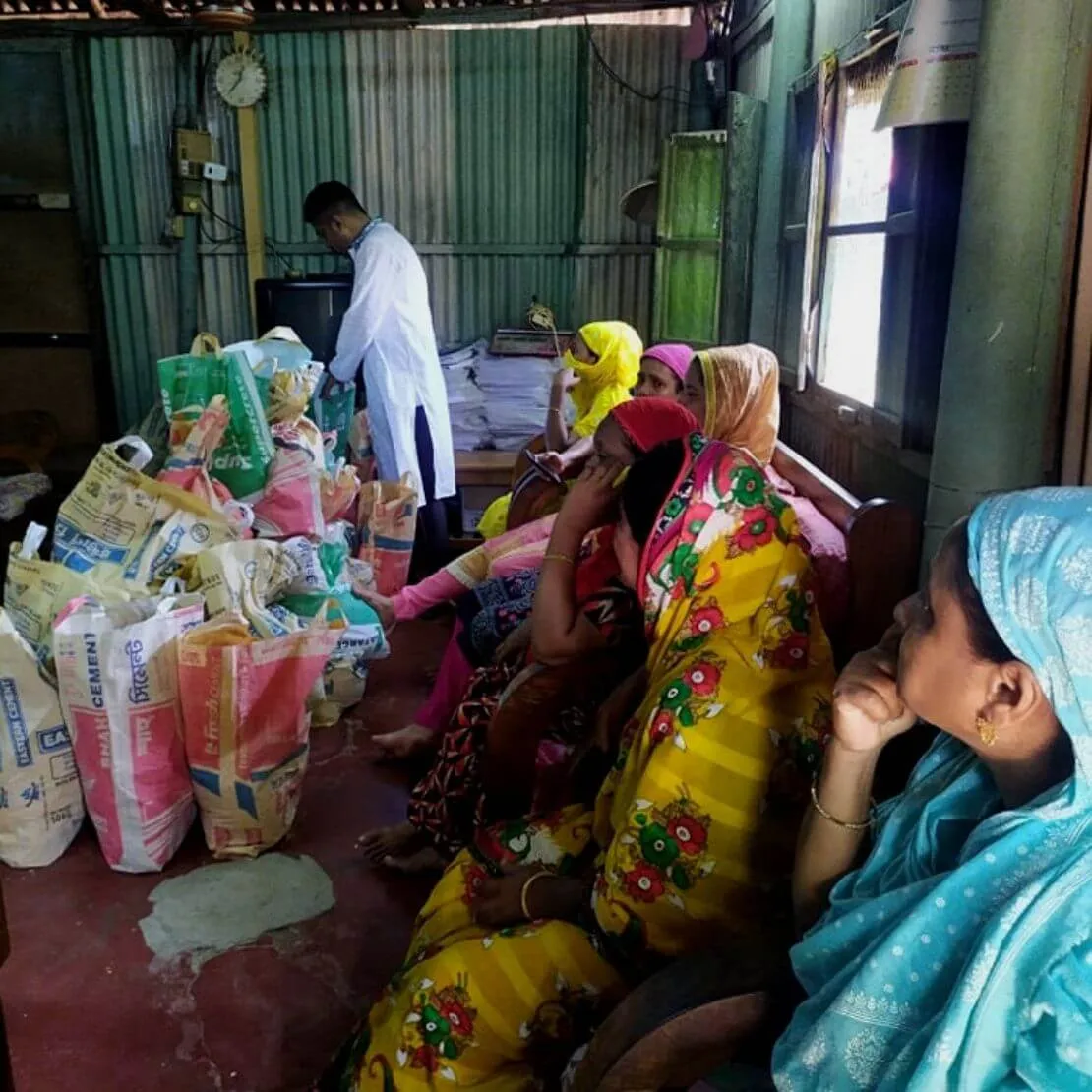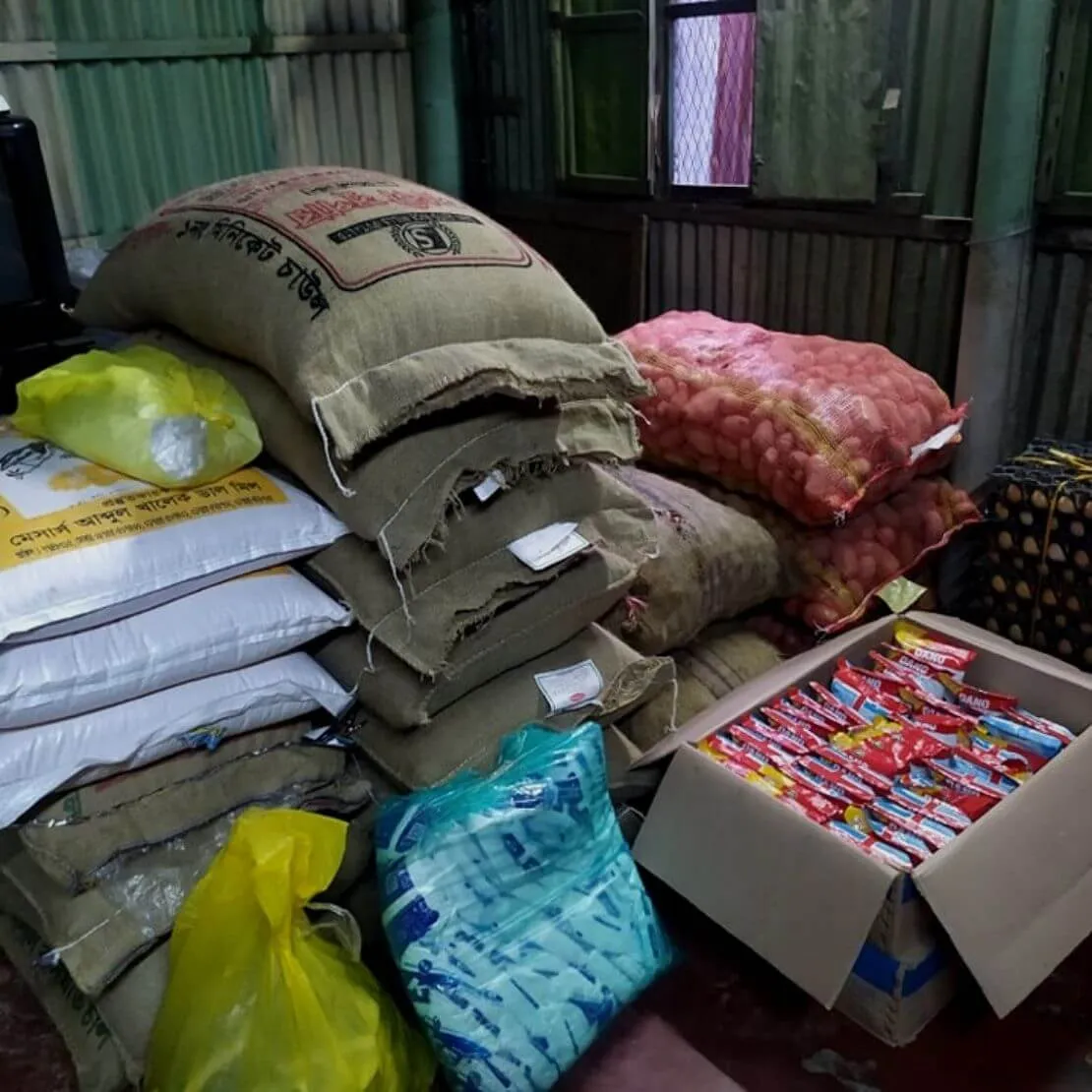"We don't just give them money; we take their problems into consideration,"
Disclaimer: The author is an organiser with Kalama Mutual Aid Collective
"Mutual aid is a revolutionary tool that is used to fight back against the charity industry…. We need long-term care that is rooted in liberation instead of giving people money that is a one-time band-aid solution to the problem." - Sharmin Hossain, community organiser.
After the lockdown corresponding to the third wave of COVID-19, dwellers in Bangladesh's largest informal settlement, Korail, were particularly devastated. Unable to work, daily wage labourers who relied on each day's wages to eat were unable to put food on the table, most of them without savings, managing children and families with no source of income. These workers include rickshaw drivers, domestic workers, and small business shopkeepers who have had to shut down. People are even unable to take out loans due to the lockdown, leaving them in dire straits. As people die or fall sick, the Bangladeshi government is not providing food to its most vulnerable populations.
Informal settlements comprise the majority of Bangladesh. A pattern of deeply rooted economic oppression is visible in the spatial segregation of these settlements throughout the country. Slums are micro-cities in themselves but are unrecognised by the government. Garment workers, rickshaw wallahs, and small shopkeepers are neglected with no resources in general, let alone during a pandemic.
However, amid these bleak structural circumstances lies tremendous mobilisation and resilience at the grassroots level. In July 2021, within hours of receiving a payout of just $1,100, Community Town Federation was on the move in Dhaka. Dozens of volunteers mobilised rapidly to contact distributors of dry food and create and distribute food packets to families in lockdown across Korail, Bangladesh's largest urban informal settlement. Their efficiency, made possible by deep interpersonal ties and intimate knowledge of the urban landscape, was mind-boggling and put government schemes to shame.

Kalama Mutual Aid Collective contacted the Community Town Federation (CTF) through Efadul Huq, Assistant Professor of Environmental Science and Policy at Smith College, for this particular initiative. Efadul connected with CTF North Dhaka in 2017 while researching housing rights and informal settlements in Dhaka. CTF is a women-led grassroots organisation in Bangladesh mobilising volunteers for community development in the country's most marginalised areas. Founded in 2008 in Dhaka, CTF leaders have collated a database of families in need, tracking their need for resources over time. They have developed a comprehensive framework for organising this vast amount of data, organising the families in various informal settlements into clusters. In North Dhaka alone, roughly 4,000 families comprise a cluster, and there are about 31 clusters total. This database has detailed, verified information of each household, associated ID and mobile numbers, and whether they are in an emergency situation (unable to eat three times a day). Across 23 towns, CTF has volunteers in every area, with informally organised teams who mobilise rapidly in times of crisis.
Thamina Akter Tonni is one of these women leaders who has been working with CTF since 2015 and has been organising with other women in Korail since 2008. She spearheads relationships in various parts of the city to distribute dry food, rice, spices, and lentils, working with urban farmers, pregnant mothers, and others. In conversations with Tonni, she has emphasised the networked nature of CTF, describing how passion drives the women leaders across the country who mobilise their families and communities to respond immediately in times of crisis and organise effectively in long-term struggles.
When asked why this particular fundraiser is important to her, Tonni highlighted women's experience, explaining that domestic violence has gone up significantly during the pandemic, as have child marriage and pregnancy rates. "Even after the lockdown, people will not have money in their hands," she said. She described how the police enter Korail and slap punitive fines on shopkeepers attempting to sell their wares, desperate to make income to survive. Even with the emergency funds mobilised to feed people, food only lasts so long. The endemic problem of poverty will persist until communities can be self-sufficient and economically empowered. "CTF's souls would have been able to smile in that case," said Tonni.
In the third wave, community organiser Sharmin Hossain worked with Efadul on a fundraiser for Korail dwellers earlier in the pandemic and mobilised her community for Kalama's fundraiser. "Partnering with people who have such deep relations with people on the ground who are value-oriented, feminist, and grassroots does not replicate systems of harm," Sharmin said. She emphasised the importance of doing social justice work from an anti-oppressive lens, applying her skills in digital organising and messaging to mobilise funds with Efadul.
Sharmin and Efadul both emphasised the liberatory nature of mutual aid. "Mutual aid is a revolutionary tool that is used to fight back against the charity industry," Sharmin said. "Charity is actually a stifling tool that is used to de-radicalise movements and also serves as tax breaks for the rich, a gift for rich people." In stark contrast, mutual aid is driven by the idea that wealthy people should no longer be wealthy at all. "We need long-term care that is rooted in liberation instead of giving people money that is a one-time Band-Aid solution to the problem."
The organisers' relationship with CTF is rooted in this deep relationship building. "We don't just give them money; we take their problems into consideration," Sharmin said. "One time the person we were donating to specifically said they do not want 'problematic money' - it's defined on their own terms." Meeting urgent material needs is vital, but the dignity and desires of recipients must be at the forefront of fundraising at all times. Sharmin noted that the government is not designed to have our backs, meaning we will have to organise to raise money for our people for the rest of our lives. For such a long-term organising landscape to be remotely sustainable, it cannot be fully rooted in guilt, shame, or anger, but rather from a place of care as an outgrowth of relationships.

In contrast to charity, which is often a one-time action of giving an organisation an item or money only to never see them again or understand where those resources went, mutual aid is built on a long-term investment in the political work of the recipients. Efadul pointed out that this investment does not always have to be a financial commitment. "Mutual aid is rooted in commitment to liberation, and commitment to a relationship," he said. "Even if I cannot pull resources together, I am there with them. I am talking to them regularly. It's not always about mobilising the resources, but about being there with people in their suffering, struggles, and in their happiness."
Historically, mutual aid efforts have been co-opted and defanged of their revolutionary power by governments, from the Black Panthers' free breakfast program in the United States to the Bangladeshi government now. "Government co-optation has already started," Efadul said. "Every time CTF mobilises hundreds of families, the local politicians try to bring the TV channels and [take credit]. Centering the care labor of women and telling the stories of CTF's organising efforts is crucial in such moments."
No one, least of all people sitting thousands of miles away, knows a local community like themselves. CTF's sheer capacity and efficiency indicate their demonstrable power as a grassroots organisation run by and for the people. Folks with wealth in the diaspora looking for ways to help should consider a recurring commitment to groups like CTF. In contrast to charity money, mutual aid is not just reactionary to crises. It is based in a simultaneous response to urgent material needs and a vision for what a truly liberated community can look like. Rooted in love and care for other individuals, mutual aid flattens the power dynamic that is often replicated between financial donor and recipient.
As the pandemic rages on and vaccine apartheid intensifies the gap between the Global North and South, Bangladesh continues to be one of the hardest hit countries. To members of the diaspora and allies, we urge you to support current mutual aid efforts for CTF, 100% of which will go to organisers like Tonni and then directly to the hands of marginalised families. If you would like to take the next step and make recurring monthly donations of any amount, you can sign up here. To reach the mutual aid organisers at Kalama Mutual Aid, you can contact us on Instagram or Twitter.
You can support the current mutual aid efforts for CTF here. Sign up to make recurring monthly donations to CTF here.
The author extends a special thank you to Efadul Huq, Sharmin Hossain, and Sajila Hossain for their co-organisation of the current mutual aid campaign.